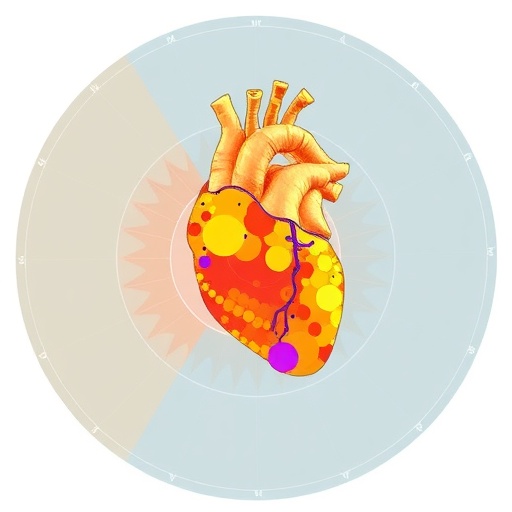Cardiovascular diseases continue to be among the foremost contributors to global mortality and morbidity, profoundly impacting individual health and the healthcare systems worldwide. They encompass a variety of conditions including atherosclerotic vascular disease, heart failure, and arrhythmias, each presenting unique challenges to diagnosis and treatment. The interrelation of these phenotypes emphasizes the complexity of cardiovascular pathology, often arising from a blend of genetic predispositions and environmental influences. As scientists delve deeper into the molecular underpinnings of these diseases, one key area of focus has emerged: the significance of genetic variations, particularly those that remain classified as ‘variants of uncertain significance’ (VUS).
The advent of genomic medicine has sparked a revolution in the diagnosis and management of cardiovascular diseases. Genetic testing can unveil pathogenic variants, offering critical insights into disease mechanisms, potential treatment pathways, and family screening recommendations. Nevertheless, the sheer volume of genetic variation—including many missense variants—poses a significant challenge. Many of these variants cannot be definitively classified due to insufficient evidence regarding their pathogenicity, leading to uncertainty in clinical settings. This gap in knowledge necessitates innovative approaches to better characterize these genetic alterations.
To address the challenge of VUS, researchers are increasingly turning to multiplexed assays of variant effects. These high-throughput methods allow for the functional assessment of almost all coding variants within a target sequence. By enabling the study of numerous variants simultaneously, multiplex assays can transform our understanding of genetic variants that arise in patients, facilitating a proactive approach to unraveling their functional significance. This transition from a reactive to a proactive genetic analysis is pivotal in refining cardiovascular disease diagnostics and therapeutics.
In conjunction with multiplexed assays, in silico variant effect predictors play a critical role in the validation of genetic findings. These computational models leverage vast datasets and sophisticated algorithms to estimate the potential impact of specific variants on protein function. Although they serve as a valuable tool to prioritize variants for further experimental validation, reliance solely on computational predictions can be misleading. The importance of empirical data from multiplexed experimental methods cannot be overstated, as they provide concrete evidence regarding variant functionality that in silico approaches alone cannot deliver.
The implications of enhanced classification of genetic variants are far-reaching in the realm of cardiovascular disease. Accurately identifying pathogenic mutations can revolutionize patient management—from more precise risk stratification and tailored treatment approaches to improved counseling for families at risk. Clinicians equipped with a clearer genetic landscape can make more informed decisions regarding interventions, unveiling new opportunities for personalized medicine in this domain.
Moreover, understanding variant effects at a granular level enhances our grasp of disease biology. For instance, differentiating between benign and pathogenic mutations allows researchers to pinpoint molecular pathways critically involved in cardiovascular pathologies. This knowledge not only has therapeutic implications but also enriches our understanding of disease etiology, potentially unveiling new targets for intervention or prevention.
The integration of multiplexed assays into genomic medicine represents an extraordinary advancement in resolving the uncertainty surrounding many genetic variants. As these techniques mature and become more widely adopted in clinical settings, they promise to shed light on numerous previously ambiguous variants. This shift could help bridge the existing gap in knowledge and evidence regarding variants that have long been a barrier to effective treatment and patient management.
The effort to create an atlas of variant effects exemplifies the collaborative spirit of modern scientific inquiry. An atlas would not only compile variant information but also contextualize each variant’s significance within the broader landscape of cardiovascular health. Such a comprehensive resource could facilitate ongoing research, foster collaboration, and ultimately serve as a critical tool for clinicians in their pursuit of improved patient outcomes.
Indeed, the path to establishing this atlas is paved with collaboration, innovation, and rigorous validation. Researchers must continue to refine methodologies and accumulate data to ensure that the knowledge generated can be reliably applied in clinical environments. By working in concert, the scientific and medical communities can turn the tide against cardiovascular diseases, transforming uncertainty associated with genetic variants into actionable insights.
As the landscape of cardiovascular genomics evolves, patients and families stand at the forefront of these advancements. The potential for more accurate diagnoses and effective treatments heralds a new era in cardiovascular medicine, empowering individuals through knowledge. Future explorations and innovations in identifying and classifying genetic variants will be pivotal in enhancing the quality of care provided to those affected by cardiovascular diseases, ultimately saving lives and improving the well-being of countless individuals.
In conclusion, the intersection of genetics and cardiovascular medicine is poised for a transformative leap. The integration of multiplexed assays and the development of comprehensive variant effect atlases may finally resolve the longstanding issue of variants of uncertain significance, equipping clinicians with the necessary tools to provide tailored care. As research continues to advance, it is critical that the medical community remains vigilant in its efforts to embrace and apply these innovations, ensuring that the promise of genomic medicine becomes a reality for those grappling with cardiovascular disease.
Subject of Research: Cardiovascular diseases and genetic variants
Article Title: Creating an atlas of variant effects to resolve variants of uncertain significance and guide cardiovascular medicine
Article References:
Glazer, A.M., Tabet, D.R., Parikh, V.N. et al. Creating an atlas of variant effects to resolve variants of uncertain significance and guide cardiovascular medicine.
Nat Rev Cardiol (2025). https://doi.org/10.1038/s41569-025-01201-7
Image Credits: AI Generated
DOI:
Keywords: Genetic variants, cardiovascular diseases, multiplexed assays, variants of uncertain significance, genomic medicine, personalized treatment.




